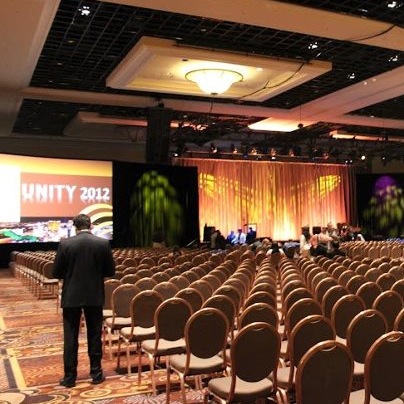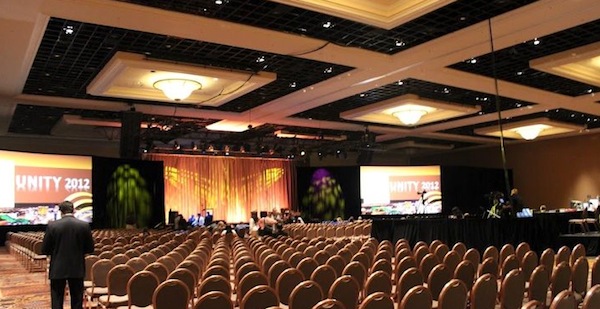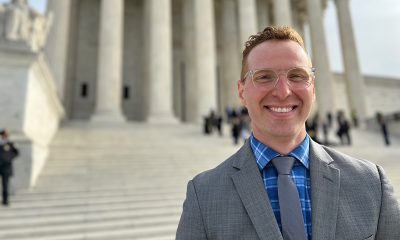National
Is reconciliation possible for minority journalist convention?
After black journalist group quits coalition, and gay journalist group joins, accusations of homophobia may mar chances of true ‘unity.’


The National Gay and Lesbian Journalists Association contended with much controversy in its first year participating in the quadrennial minority journalist convention, UNITY. (Photo by Matthew Mullins)
Though the largest regular gathering of journalists in the nation included LGBT members for the first time, the coalition for minority journalists known as UNITY may be heading toward demise.
As first reported by the Maynard Institute, UNITY executive director Onica Makwakwa says the conference attracted 2,000 attendees this year, far below the 7,550 journalists who saw then Democratic Presidential candidate Barack Obama address the Chicago gathering. According to the Maynard Institute, Unity attracted 2,385 attendees. Much of that decline can be attributed to the absence of founding organization, the National Association of Black Journalists, which pulled out of the coalition after 18 years in 2011 citing disputes over the division of finances, and held its own New Orleans conference attracting 2,386 in June.
Though NLGJA was only invited to the coalition after the NABJ departure, a ‘black vs. gay’ narrative has been explored in some of the most recent coverage of the split. After NLGJA was invited into UNITY late last year, the organization successfully lobbied the coalition to change its name from UNITY: Journalists of Color, Inc. to solely UNITY Journalists, generating criticism from some NABJ members, including the organization’s president Gregory Lee, according to the Village Voice.
According to the Voice, NABJ has long been accused of opposing NLGJA’s membership in the coalition, which has been voted on several times by the UNITY board over the past decade and a half. However, Lee flatly denies the accusation of homophobia driving the split — citing his group’s LGBT task force, a first among minority journalist groups — and tells the Voice’s Steven Thrasher that after being forced to lay off staff, the coalition’s largest member — contributing more than half of the attendees in 2008 — was opposed to the financial split that saw NABJ receive a mere 35 percent return on profits.
However, Lee accuses NLGJA of lacking diversity in its leadership, which NLGJA leaders claim is a driving factor behind the organization’s desire to be part of the UNITY coalition. Attract black, Hispanic, Asian and Native American LGBT journalists to the organization, as well as share in the common experience of being part of an underrepresented community in the newsroom, can benefit all attendees of the quadrennial conference, according to NLGJA members.
“I know the perception among some folks of color is that NLGJA is an organization run by a bunch of white guys,” Michelle Johnson of Boston University, and a member of both NABJ and NLGJA told the New York Times. “There are white guys that are in the organization who have also faced discrimination in the newsroom.”
Ken Miguel — segment producer at ABC affiliate KGO-TV in San Francisco and a National Board member of NLGJA — could not speak to the Blade officially for the Board, but said personally he was disappointed with what he perceived as a missed opportunity for the National Association of Black Journalists to meet and get to know LGBT journalists at the Unity Conference.
“If they wanted to show this was not about homophobia and race then they should have made an effort to be at [the NLGJA] events, and to get face time, and to shake hands with NLGJA journalists and let us know this is not about us,” Miguel said, saying that while Lee, and many other NABJ leaders were in attendance August 1 – 4 in Las Vegas, he felt they stayed away from LGBT-related panels and events. “I was on some panels where it was absolutely fantastic where [Native American Journalist Association] and [Asian American Journalist Association] and [National Association of Hispanic Journalists] members who were not gay were asking the right questions about what should they be covering.”
In the conference’s opening session hosted by CNN Worldwide executive vice president and managing editor, Mark Whittaker, ESPN writer and NABJ, NLGJA member LZ Granderson continued to take NABJ to task regarding its reluctance to rejoin the UNITY coalition following the name change.
“Homophobia has played a role in this tension, race has certainly played a role in this tension, money has played a role in this tension,” Granderson said. “And ALL of those things need to be talked about and hashed and on the table, not just the ones that are P.C.”
“You want to talk historically is there homophobia within [NABJ]? Yes,” KGO-TV’s Miguel told the Blade. “But do you want to say NABJ was the only group that voted that way? I know people who were members of the board then who told me, when we were discussing whether or not we should join Unity, that they were not the only ones that voted that way.”
Other longstanding members of NLGJA that attended the conference were skeptical about the need for the LGBT journalist group to continue to partner with UNITY.
“In the end, it seemed like being part of the Unity convention was more about what was good for NLGJA as an organization and less about its members,” lamented former NLGJA conference co-chair Fred Kuhr, who now edits the LGBT media trade publication, Press Pass Q, and says that the lack of programming integration between the four associations was disappointing.
The UNITY board was not the only entity to face pressures over inclusion in its name at this year’s conference. During a Thursday members meeting, several NLGJA members expressed disappointment the organization’s name excludes bisexual and trans members. Outgoing board president, David Steinberg and NLGJA executive director Michael Tune both assured the members gathered that concerns would be taken seriously and that the organization would consider evaluating the problem. This reporter was one of the members present who spoke out in favor of a name change during that discussion.
During that meeting, NLGJA members were also introduced to the organization’s new board President, Washington D.C. native, Michael Triplett, who is an assistant managing editor at Bloomberg-BNA and has served long on the board. Triplett said few words as he was recovering from laryngitis, but expressed a desire for members to come to him with ideas and concerns.
Though LGBT attendees of the conference disagreed over future participation, most agreed that the conference was an overall positive experience.
“Its no secret that I was the voice of doubt [on the Board] that this was going to work,” said Miguel. “do I think that it’s been beneficial for the organization? Yes, my eyes have been opened. I hope that the other minority journalists that did attend, their eyes were opened too, and I get a sense that that was the case.”
Both NABJ’s Lee and former NABJ President and co-founder of UNITY Will Sutton expressed hope that a reconciliation could occur between the group and UNITY, a sentiment echoed throughout the weekend by leaders from NAJA, NAHJ and AAJA, the other three founding members of the coalition. However, Lee implied that a condition of rejoining would be for members to vote on NLGJA’s continued participation in UNITY, despite the organization’s full participation this year.
“Since NABJ chose to pull out of UNITY, why is it even making a stink and making statements about UNITY now?” Kuhr — who has attended all but one NLGJA national conference since 1994 — told the Blade. “If they want to work to make UNITY better, then rejoin. If not, then stop making trouble from the sidelines. This kind of political back-and-forth is not helpful to UNITY and its other member organizations. If this squabbling can’t be tamped down, then it’s one more reason for NLGJA not to remain in UNITY.”
Phil Reese is a member of the National Lesbian and Gay Journalist Association and a member of the local D.C. chapter board.
State Department
HIV/AIDS activists protest at State Department, demand full PEPFAR funding restoration
Black coffins placed in front of Harry S. Truman Building

Dozens of HIV/AIDS activists on Thursday gathered in front of the State Department and demanded the Trump-Vance administration fully restore President’s Emergency Plan for AIDS Relief funding.
Housing Works CEO Charles King, Health GAP Executive Director Asia Russell, Human Rights Campaign Senior Public Policy Advocate Matthew Rose, and others placed 206 black Styrofoam coffins in front of the State Department before the protest began.
King said more than an estimated 100,000 people with HIV/AIDS will die this year if PEPFAR funding is not fully restored.
“If we continue to not provide the PEPFAR funding to people living in low-income countries who are living with HIV or at risk, we are going to see millions and millions of deaths as well as millions of new infections,” added King.
Then-President George W. Bush in 2003 signed legislation that created PEPFAR.
The Trump-Vance administration in January froze nearly all U.S. foreign aid spending for at least 90 days. Secretary of State Marco Rubio later issued a waiver that allows the President’s Emergency Plan for AIDS relief and other “life-saving humanitarian assistance” programs to continue to operate during the freeze.
The Washington Blade has previously reported PEPFAR-funded programs in Kenya and other African countries have been forced to suspend services and even shut down because of a lack of U.S. funding. Two South African organizations — OUT LGBT Well-being and Access Chapter 2 — that received PEPFAR funding through the U.S. Agency for International Development and the Centers for Disease Control and Prevention in recent weeks closed down HIV-prevention programs and other services to men who have sex with men.
Rubio last month said 83 percent of USAID contracts have been cancelled. He noted the State Department will administer those that remain in place “more effectively.”
“PEPFAR represents the best of us, the dignity of our country, of our people, of our shared humanity,” said Rose.
Russell described Rubio as “ignorant and incompetent” and said “he should be fired.”
“What secretary of state in 90 days could dismantle what the brilliance of AIDS activism created side-by-side with George W. Bush? What kind of fool could do that? I’ll tell you who, the boss who sits in the Harry S. Truman Building, Marco Rubio,” said Russell.

U.S. Military/Pentagon
Pentagon urged to reverse Naval Academy book ban
Hundreds of titles discussing race, gender, and sexuality pulled from library shelves

Lambda Legal and the Legal Defense Fund issued a letter on Tuesday urging U.S. Defense Secretary Pete Hegseth to reverse course on a policy that led to the removal of 381 books from the Nimitz Library of the U.S. Naval Academy in Annapolis, Md.
Pursuant to President Donald Trump’s executive order 14190, “Ending Radical Indoctrination in K-12 Schooling,” the institution screened 900 titles to identify works promoting “diversity, equity, and inclusion,” removing those that concerned or touched upon “topics pertaining to the experiences of people of color, especially Black people, and/or LGBTQ people,” according to a press release from the civil rights organizations.
These included “I Know Why the Caged Bird Sings” by Maya Angelou, “Stone Fruit” by Lee Lai, “The Hate U Give” by Angie Thomas, “Lies My Teacher Told Me: Everything Your American History Textbook Got Wrong” by James W. Loewen, “Gender Queer: A Memoir” by Maia Kobabe, and “Democracy in Black: How Race Still Enslaves the American Soul” by Eddie S. Glaude, Jr.
The groups further noted that “the collection retained other books with messages and themes that privilege certain races and religions over others, including ‘The Clansman: A Historical Romance of the Ku Klux Klan’ by Thomas Dixon, Jr., ‘Mein Kampf’ by Adolf Hitler, and ‘Heart of Darkness’ by Joseph Conrad.
In their letter, Lambda Legal and LDF argued the books must be returned to circulation to preserve the “constitutional rights” of cadets at the institution, warning of the “danger” that comes with “censoring materials based on viewpoints disfavored by the current administration.”
“Such censorship is especially dangerous in an educational setting, where critical inquiry, intellectual diversity, and exposure to a wide array of perspectives are necessary to educate future citizen-leaders,” Lambda Legal Chief Legal Officer Jennifer C. Pizer and LDF Director of Strategic Initiatives Jin Hee Lee said in the press release.
Federal Government
White House sues Maine for refusing to comply with trans athlete ban
Lawsuit follows months-long conflict over school sports in state

The Justice Department is suing the state of Maine for refusing to comply with President Donald Trump’s executive order banning transgender athletes from participating in school sports, U.S. Attorney General Pam Bondi announced on Wednesday.
DOJ’s lawsuit accuses the state of violating Title IX rules barring sex discrimination, arguing that girls and women are disadvantaged in sports and deprived of opportunities like scholarships when they must compete against natal males, an interpretation of the statute that reverses course from how the law was enforced under the Biden-Harris administration.
“We tried to get Maine to comply” before filing the complaint, Bondi said during a news conference. She added the department is asking the court to “have the titles return to the young women who rightfully won these sports” and may also retroactively pull federal funding to the state for refusing to comply with the ban in the past.
Earlier this year, the attorney general sent letters to Maine, California, and Minnesota warning the blue states that the department “does not tolerate state officials who ignore federal law.”
According to the Maine Principals’ Association, only two trans high school-aged girls are competing statewide this year. Conclusions from research on the athletic performance of trans athletes vis-a-vis their cisgender counterparts have been mixed.
Trump critics and LGBTQ advocates maintain that efforts to enforce the ban can facilitate invasive gender policing to settle questions about an individual athlete’s birth sex, which puts all girls and women at risk. Others believe determinations about eligibility should be made not by the federal government but by school districts, states, and athletics associations.
Bondi’s announcement marked the latest escalation of a months-long feud between Trump and Maine, which began in February when the state’s Democratic governor, Janet Mills, declined to say she would enforce the ban.
Also on Wednesday, U.S. Education Secretary Linda McMahon said the findings from her department’s Title IX investigation into Maine schools — which, likewise, concerned their inclusion of trans student-athletes in competitive sports — was referred to DOJ.
Earlier this month, the Justice Department pulled $1.5 million in grants for Maine’s Department of Corrections because a trans woman was placed in a women’s correctional facility in violation of a different anti-trans executive order, while the U.S. Department of Agriculture paused the disbursement of funds supporting education programs in the state over its failure to comply with Title IX rules.
A federal court last week ordered USDA to unfreeze the money in a ruling that prohibits the agency from “terminating, freezing, or otherwise interfering with the state’s access to federal funds based on alleged Title IX violations without following the process required by federal statute.”
-

 District of Columbia5 days ago
District of Columbia5 days agoFinal push to raise funds, fill D.C. hotels as WorldPride nears
-

 El Salvador3 days ago
El Salvador3 days agoGay Venezuelan makeup artist remains in El Salvador mega prison
-

 District of Columbia4 days ago
District of Columbia4 days agoReenactment of 1965 gay rights protest at White House set for April 17
-

 Maryland5 days ago
Maryland5 days agoFreeState Justice: Transgender activist ‘hijacked’ Moore’s Transgender Day of Visibility event












